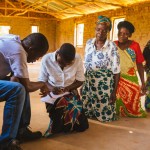Olivier Ecker, Jean-François Maystadt, Zhe Guo
Hunger and acute child malnutrition are increasingly concentrated in fragile countries and civil conflict zones. According to the United Nations, Yemen’s civil war has caused the world’s worst humanitarian crisis in recent history. We use high-frequency panel data and district fixed-effects and household fixed-effects models to estimate the impact of civil conflict on child nutrition. Source: IFPRI Egypt Country Office

